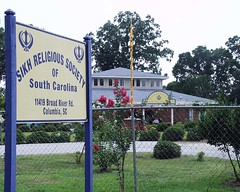Back at Christchurch, Clarendon Park Road, this evening. I attended - and thoroughly enjoyed - the courses that were run here by Christians Aware, "Celebrating the Diversity of Hinduism" (autumn 2009) and "Mindfulness" (spring this year). The course this time is entitled "Faith in the Planet". I've not been able to attend this one, much to my regret, but I am here tonight as speaker. My topic is printed in the programme as "The Bahá'í Green Movement". Strictly speaking, there's no such thing of course. While it would be ridiculous to claim that whatever we might call "the green movement" originated in the Bahá'í teachings, it would be fair to say that it's been integral to the Bahá'í way of thinking and acting since day one. I would find it hard to see how anyone seriously could claim to be Bahá'í and
not be green. Those who know Bahá'ís well enough get the fact that there aren't really any "movements" within the Bahá'í Faith and that Bahá'ís themselves take great care that no one gets the impression there are any significant divisions within their community. When I was asked to speak on this topic, my title was given as "Bahá'ís and the Green Movement" which makes a wee bit more sense.
Speakers in this series before me have been: Andrew Reeves from Transition Leicester; Barbara Butler ("A Gandhian Approach"); Ziyaa Lorgat from Earth Guardians ("Green Movement in Islam"); Caroline Brazier ("Green Buddhism"); Allen Hayes from Leicester Secular Society ("A Humanist View"). Next week, Alan Stead of Christchurch will speak on "An Eco-Congregation".
A small group tonight (of seven) but a lovely supportive atmosphere. I begin with some extracts from the book
Sacred Earth: The spiritual nature of our material world.
This compilation of extracts from the writings and traditions of many religions was produced to accompany a reception at Canada House, Traflagar Square, London in May 2001, honouring the life of Madame Ruhiyyih Rabbani, preeminent international dignitary of the Baha'i Faith at the time of her passing. In attendance at the event, organised by the Arts for Nature, were some 150 prominent people, including HRH The Prince Philip, Duke of Edinburgh. I want to give a name check here to my old mucker, Pete Maguire, who worked long into many nights to design this book. I know this because on most of those nights, I was sitting beside him, working on the text! The book has a haunting, ethereal quality which readers have always remarked upon, and they do so, even tonight.
After allowing the extracts to set the tone, I present my talk, built around a series of quotations, as laid out below. We read these together then discuss them as a group.
"We cannot segregate the human heart from the environment outside us and say that once one of these is reformed everything will be improved. Man is organic with the world. His inner life moulds the environment and is itself also deeply affected by it. The one acts upon the other and every abiding change in the life of man is the result of these mutual reactions." (From a letter written on behalf of Shoghi Effendi, Guardian of the Bahá'í Faith, 1933)
"Nature in its essence is the embodiment of My Name, the Maker, the Creator. Its manifestations are diversified by varying causes, and in this diversity there are signs for men of discernment. Nature is God's Will and is its expression in and through the contingent world." (From the writings of Bahá’u’lláh)
"Every man of discernment, while walking upon the earth, feeleth indeed abashed, inasmuch as he is fully aware that the thing which is the source of his prosperity, his wealth, his might, his exaltation, his advancement and power is, as ordained by God, the very earth which is trodden beneath the feet of all men. There can be no doubt that whoever is cognisant of this truth, is cleansed and sanctified from all pride, arrogance, and vainglory." (From the writings of Bahá’u’lláh)
"The vast forces of science and technology must be harnessed to serve the material, intellectual, emotional and spiritual needs of the entire human family. This will require that all peoples be involved in generating scientific knowledge and determining its applications. As participation increases, technologies which have tended to desensitize and alienate, to make satisfying work and crafts redundant, to destroy the environment, and to cause sickness, infirmity or death, will, no doubt, be reconsidered, redesigned or abandoned." (Bahá'í International Community, Sustainable Communities in an Integrating World - 1997)
"The changes required to reorient the world toward a sustainable future imply degrees of sacrifice, social integration, selfless action, and unity of purpose rarely achieved in human history. These qualities have reached their highest degree of development through the power of religion. Therefore, the world's religious communities have a major role to play in inspiring these qualities in their members, releasing latent capacities of the human spirit and empowering individuals to act on behalf of the planet, its peoples, and future generations." (Bahá'í International Community, Earth Charter - 1997)
Here's a link to the archives of the Bahá'í World News Service, reporting the special occasion at Canada House in 2001 for which the book
Sacred Earth was produced:
http://news.bahai.org/story/124
Find out more about Christians Aware:
http://www.christiansaware.co.uk/
















